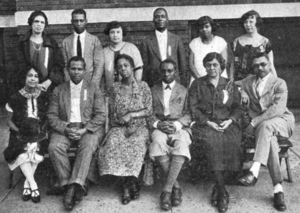National Association of Negro Musicians facts for kids

The newly-elected officers of the National Association of Negro Musicians in 1925; standing, from left, Camille Nickerson, Henry Grant, Lillian Lemon, J. Wesley Jones, Lillian Carpenter, Adelaide Herriot; seated, from left, Mildred Bryant Jones, Carl Rossini Diton, Alice Carter Simmons, Robert Nathaniel Dett, Martha Broadus Anderson, and Clarence Cameron White.
|
|
| Formation | 1919 |
|---|---|
The National Association of Negro Musicians, Inc. (NANM) is one of America's oldest groups. It helps keep alive and celebrate all kinds of music made by African-Americans.
NANM started on May 3, 1919, in Washington, D.C. This happened at a meeting of "Negro" musicians. Henry Grant and Nora Holt led this first gathering. Later that year, the first big national meeting was held in Chicago, Illinois. This was done with the Chicago Music Association.
The organization wants to create a musical culture where everyone is included. Members support each other and share their knowledge. Teachers and professional musicians share what they know. People who enjoy music as a hobby can also grow. Everyone, no matter their age, can share and take part in music.
Since it began, NANM has helped many African American musicians. Many of them became famous and important in music history. They have given scholarships to many talented young musicians.
Contents
Supporting Young Musicians
NANM has given scholarships to many young musicians. These scholarships help them study and grow their talents. Some famous people who received scholarships include:
- Marian Anderson (the very first scholarship winner in 1919)
- William L. Dawson
- Florence Price
- Margaret Bonds
- Julia Perry
- Grace Bumbry
- Leon Bates
- Awadagin Pratt
These scholarships have helped many young people achieve their musical dreams.
Famous Performers and Speakers
Over the years, many well-known musicians have performed at NANM events. These include:
- Lena Horne
- Todd Duncan
- Marian Anderson
- R. Nathaniel Dett
- Margaret Bonds
- Florence Price
- Jessye Norman
- Nina Simone (also known as Eunice Waymon)
- William Warfield
- Billy Taylor
Many important speakers and teachers have also shared their knowledge. Some of these include:
- Eileen Southern
- Grace Bumbry
- James Cleveland
- Willis Patterson
- Shirley Verrett
NANM has several local groups across the country. Each year, NANM holds a big national meeting in different cities.
Leaders of NANM
The National Association of Negro Musicians has had many important leaders. Here are some of the people who have served as president:
- Henry Grant (1919-1922)
- Clarence Cameron White (1922-1924)
- Robert Nathaniel Dett (1924-1926)
- Carl Rossini Diton (1916-1928)
- John Wesley Jones (1926-1930)
- Lillian Lemon (1930-1933)
- Maude Roberts George (1933-1935)
- Camille Nickerson (1935-1938)
- Kemper Harreld (1938-1940)
- Mary Cardwell Dawson (1940-1942)
- Clarence H. Wilson (1942-1952, 1965-1968)
- Roscoe Polin (1952-1960)
- Clarence Billups (1960-1965)
- Theodore Charles Stone (1968-1975)
- Brazeal Dennard (1975-1980)
- Betty Jackson King (1980-1985)
- William Warfield (1985-1990)
- Willis Patterson (1990-1995)
- Uzee Brown Jr. (1995-2002)
- Roland Carter (2002-2008)
- David Morrow (2008-2014)
- Byron Smith (2014-2019)
- Anne-Marie Hudley Simmons (2019-present)
What NANM Aims to Do
NANM has a clear mission. It works to promote, protect, and support all types of music. This includes music created or performed by African-Americans.
Goals of the Organization
NANM has several important goals:
- To promote music and help people learn about it. This especially includes music composed by people of African descent.
- To create a special library. This library collects historical information about African-American composers, artists, and musicians. This information is then used for books and other publications.
- To gather and buy collections of sheet music and original documents. This helps bring old works back to life for historical use. They also research the works of African-American artists and composers.
- To offer scholarships and grants. These are given at national, regional, and local levels. They help talented young people in music and cultural arts get an education.
- To help everyone better understand the important contributions of people of African descent. This includes their work in all areas of music and cultural arts.
 | Chris Smalls |
 | Fred Hampton |
 | Ralph Abernathy |

